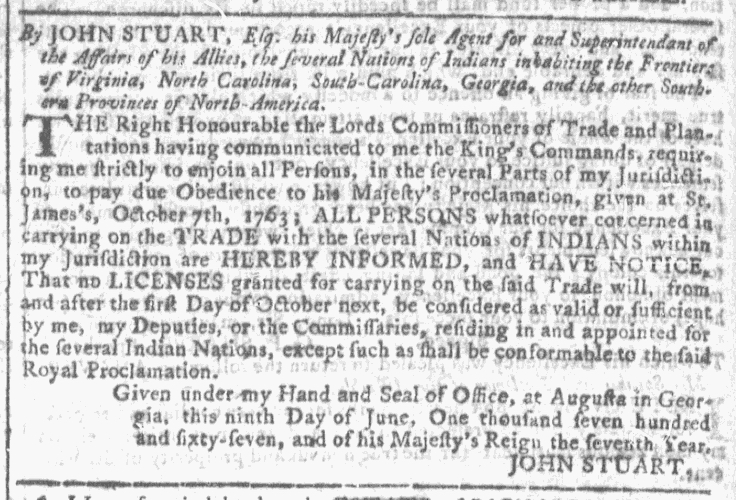What was advertised in a colonial American newspaper 250 years ago today?

“All Persons … pay due Obedience to his Majesty’s Proclamation.”
John Stuart served as the Superintendent of Indian Affairs for Britain’s southern colonies from 1761 to 1779. Based in South Carolina, the Scottish-born official was counterpart to William Johnson in the northern colonies. Stuart and Johnson were charged with overseeing relations between indigenous Americans and Great Britain and the colonies. In the wake of British victory in the Seven Years War, the superintendents exercised diplomacy in their efforts to prevent violence and other conflict between settlers and Indians residing in the frontier lands newly acquired by the empire.
In this advertisement, Stuart pursued his duties. He informed “ALL PERSONS … carrying on the TRADE with … INDIANS … That no LICENSES granted for carrying on the said Trade will … be considered valid … except such as shall be conformable to the said Royal Proclamation.” Here he invoked what has become known as the Royal Proclamation of 1763, issued on October 7 of that year by George III.
That document provided a framework for managing Britain’s new territories ceded by the French at the conclusion of the Seven Years War. In addition to establishing four new colonies with military governments (Quebec, East Florida, West Florida, and Granada) and enumerating a scheme for distributing land to war veterans, the Royal Proclamation also addressed relations with indigenous Americans to the west of the Appalachians by creating the Proclamation Line. Settlers were forbidden to move into territory reserved for Indians, an attempt to prevent hostile encounters and pan-Indian uprisings like Pontiac’s War. The king and his advisors believed this would establish stability and order within the empire, but colonists felt betrayed. They had just fought and made sacrifices for Great Britain in a long war, but now the Royal Proclamation denied them the spoils they expected by prohibiting westward expansion. To add insult to injury, the proclamation seemed to protect Indians who recently fought against Britain at the expense of loyal subjects. Even before the Stamp Act crisis and other legislation that led to cries of “no taxation without representation,” the Royal Proclamation of 1763 angered colonists and alienated them from Britain.
In today’s advertisement, superintendent John Stuart invoked provisions of “his Majesty’s Proclamation, given at St. James’s, October 7th, 1763” to regulate trade between colonists and Indians. While other portions of the newspaper included news from London about “a plan for taxing America … now under consideration,” Stuart’s notice reminded colonists of other ways that a faraway government meddled in local affairs.
